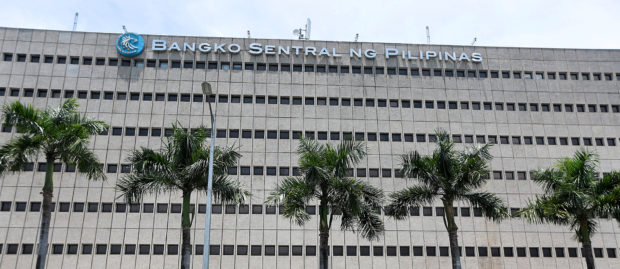
Bangko Sentral ng Pilipinas (BSP). INQUIRER FILE PHOTO / GRIG C. MONTEGRANDE
MANILA, Philippines — The central bank wants financial institutions to be better prepared for the risks associated with shifting more credit “green” borrowers and away from those engaged in more traditional carbon-heavy economic activities.
As such, the Bangko Sentral ng Pilipinas on Tuesday said it will be issuing second-phase regulations to allow the banking industry to be more responsive to risks arising from the transition to a low-carbon economy.
“This issuance will provide granular expectations on the integration of climate change and other environmental and social risks in banks’ credit and operational risk management frameworks,” BSP Governor Benjamin Diokno said during the recent Investment Forum on Energy Transition.
The release of these new regulations follows the BSP’s issuance in April 2020 of the Sustainable Finance Framework which encourages the offering of green and sustainable finance instruments.
“At the same time, the framework safeguards the stability of the financial system against potentially significant and protracted impact of climate change and other environment-related risks,” he said.
Leveraging on good governance and effective risk management systems, the framework also expects banks to embrace sustainability principles and take strategic, concrete, and progressive actions in response to the climate call.
“Central to the climate change mitigation goal is the need to reduce greenhouse gas concentrations by shifting fossil fuels to renewable sources,” Diokno said.
“We should note, however, that a successful transition is not just a matter of isolated changes in the energy sector,” he added. “We must also consider the potential risks associated with this transition given the interplay among economic activities.”
These new safeguards come after Diokno urged the local banking community to redouble efforts at mitigating the effects of climate change by supporting green and sustainable finance as part of their lending strategies.
As of mid-2020, the BSP noted that banks have so far issued $1.8 billion worth of debt securities that comply with environmental and climate risk management tenets, in addition to P21.5 billion worth of social bonds.
Based on the sustainability or allocation reports of selected banks, around 10.6 percent of the total loan portfolio of the banking system as of end-2019 were disbursed in loans to finance green and social projects and contribute to achieving the United Nations’ Sustainable Development Goals.
The agency has integrated “sustainable central banking” in its strategic map for 2020-2023 to foster environmentally responsible and sustainable policies and work practices. At the same time, the BSP is working closely with banks to formulate a sustainable finance framework.

